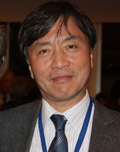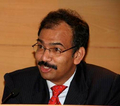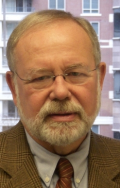Strategic Advisory Group
The IDRC Davos 2014 Strategic Advisory Group supported the chairman in the preparation of the IDRC Davos 2014. GRF Davos is grateful for the support of the Strategic Advisory Group which consisted of (in alphabetical order):

Walter J. Ammann
Chairman of the International Disaster and Risk Conference IDRC Davos; Founder and President of the Foundation Global Risk Forum GRF Davos
Dr. Walter J. Ammann obtained his MSc in Civil Engineering and his PhD in structural dynamics and earthquake engineering both at ETH Zurich. He started his professional career in various consulting companies for geotechnics and foundation engineering, earthquake engineering and bridge construction. From 1986 - 1992 he was responsible for the R&D-department of a globally acting company in construction technologies. From 1992 to 2007, he was director of the Swiss Federal Institute for Snow and Avalanche Research in Davos and Deputy Director of the Swiss Federal Research Institute WSL in Birmensdorf. He is an expert in integrative risk management and its applications to all kinds of natural hazards and technical risks, in particular by considering the entire risk cycle with prevention, preparedness, intervention and recovery, risk financing tools, but also emergency management and communication tools with a focus on early warning, crisis management, critical infrastructures, and resilience increase. Climate change related hazards and risks, their adaptation and mitigation and their harmonization with disaster and risk reduction is of particular concern for him. He is author and co-author of over 250 papers, books and scientific reports and is a member of various national and international professional associations and expert consulting groups like the UN-ISDR Science and Technology Council and is Visiting Professor at HIT in Harbin, China.

Pedro Basabe
Senior Programme Officer, UN Office for Disaster Risk Reduction, Geneva, Switzerland
Pedro Basabe, geologist and Dr. ès Sc. in hydrogeology, has vast expertise in applied geology, natural hazard identification, mapping, monitoring systems, research and project management since 1979. During the nineties, he formulated and implemented several international projects on disaster risk management in Latin America for the Swiss Agency for Development and Cooperation, Humanitarian Aid (SHA) in coordination with the UN. He is also UNDAC and SHA member since 1995 participating in number of disaster preparedness, evaluation and coordination missions. He joined the UN Office for Disaster Risk Reduction (UNISDR) in November 2001, where has have increased responsibilities, contributing to DRR knowledge and capacity development, publications, partnership development, drought risk reduction practices and linkages with humanitarian sector to promote holistic and integrated disaster risk management. The last five years he has been heading the UNISDR Regional Office for Africa in Nairobi, actively developing collaboration with the Africa Union Commission, Regional Economic Communities, 38 countries, UN partners, donors and scientific-technical community. As result, Africa has a continental Programme for Disaster Risk Reduction, mechanisms for coordination, Sub-regional policies and/or programmes, some of them implemented in several countries. Mr. Basabe is currently back at the UNISDR headquarters, in charge of science, technology and expertise for disaster risk management, water and disasters and partnership development to translate policies into practices.

Mechthilde Fuhrer
Deputy Executive Secretary of the European and Mediterranean Major Hazards Agreement of the Council of Europe
Mechthilde Fuhrer has been active in the field of educational, cultural and environmental issues and holds a Doctorate in Human Sciences and a Master degree in Social and Cultural Anthropology. She has worked since 1996 in the Council of Europe as Deputy Executive Director at the European Centre for Modern Languages, then as administrator in the field of Citizenship and human rights education, Education Policies and European Dimension, Higher Education and History Teaching, Democratic Governance, Culture and Diversity. At present she acts as Deputy Executive Secretary of the European and Mediterranean Major Hazards Agreement (EUR-OPA). This 1987 International Agreement is a platform of cooperation between European and Southern Mediterranean states in major natural and technological hazards. Within her functions she is working amongst others on promotion through appropriate common initiatives with other organisations in the field of major hazard prevention and organisation of relief.

Virginia Murray
Vice-Chair of the UNISDR Scientific and Technical Advisory Group; Public Health Consultant in Global Disaster Risk Reduction, Public Health England, London, UK
Professor Virginia Murray was appointed as Public Health Consultant in Global Disaster Risk Reduction for Public Health England in April 2014. This appointment is to take forward her work as vice-chair of the UN International Strategy for Disaster Reduction (ISDR) Scientific and Technical Group and is one of the members of the UNISDR Advisory Group for the Post-2015 Framework for Disaster Risk Reduction. Prior to this she was appointed as Head of Extreme Events and Health Protection, Public Health England in January 2011. With the Extreme Events team, she helped to develop evidence base information and advice on flooding, heat, cold, volcanic ash, and other extreme weather and natural hazards events. Appointed as Visiting Professor in Health Protection, MRC-HPA Centre for Environment and Health, Imperial College and King’s College, London (2004) and Honorary Professor at University College London (2013), she has published widely.

Han Quinli
Director, Division of Ecological and Earth Sciences (SC/EES), Secretary, Man and the Biosphere (MAB) Programme, UNESCO Headquartes, Paris, France
Joined UNESCO in 1990, Mr Han worked on application of geographic information in biosphere reserves in Kenya, Indonesia and China, contributed to the development of East Asian Biosphere Reserve Network and the initiation of web-based MABnet. Moved to Jakarta in 1998, he served as Asia-Pacific regional officer for environmental sciences, including MAB and natural World Heritage. Mr Han moved to UNESCO Tehran Office as Director and UNESCO Representative in July 2007. In July 2011, he was appointed as the Director of Science Executive Office and in July 2013 to the current post. During his assignments in Asia-Pacific region, Mr Han participated in a number of UN response to natural disasters, including UNESCO work toward 2004 Indian Ocean earthquake and tsunami, Yogyakarta earthquake 2005, and UN country team work in Iran to support recovery from 2003 Bam earthquake. Before UNESCO, Mr Han was a researcher in the Integrated Survey of Natural Resources of the Chinese Academy of Sciences.

Stephan Schreckenberg
Head Risk Research Relations, Swiss Re, Zurich, Switzerland
Dr. Stephan Schreckenberg, Head Risk Research Relations, is responsible for generating and steering business-relevant applied risk research with external partners for Swiss Re and maintains Swiss Re's Risk Network of external risk experts, Prior to his current role, Stephan Schreckenberg worked for more than 10 years in Swiss Re's corporate risk management department. As Head of Internal Risk Modelling, he was responsible for modelling the combined economic risk of Swiss Re's portfolio of insurance, financial market and credit risks. He contributed to building Swiss Re''s Enterprise Risk Management through many risk and capital management related projects. He also served for seven years as Switzerland''s insurance industry representative to the Solvency II Steering Group at the European Insurance Industry Association (CEA).

Muralee Thummarukudy
Chief of Disaster Risk Reduction at United Nations Environment Programme, Geneva, Switzerland
Muralee Thummarukudy is currently the Chief of Disaster Risk Reduction at United Nations Environment Programme. Dr. Thummarukudy holds a PhD in Environmental Engineering from Indian Institute of Technology. He is an Alumni of the United Nations University and a Beahrs’ fellow at the University of California, Berkeley. Dr. Thummarukudy has over 20 years of experience in Environment and Disaster Management around the world. Between 1995 and 2003, Dr. Thummarukudy was Corporate Advisor to Shell operated oil companies in Middle East dealing with oil industry related emergencies. Since 2003, Dr. Thummarukudy has been with the Post Conflict and Disaster Management Branch of UNEP. Dr. Thummarukudy coordinated the projects in Iraq, Lebanon and occupational Palestine territories, and was further involved in post disaster situations in China, Myanmar, Haiti and Japan.

Dennis Wenger
Chair of the UNISDR Scientific and Technical Advisory Group, National Science Foundation (NSF), Arlington, USA
Dennis Wenger is the Program Director for program element 1638, Infrastructure Systems Management and Extreme Events, at the National Science Foundation (NSF). He is also the Acting Program Director for the Civil Infrastructure Systems program. He had previously been at NSF from 2001-2005. Dr. Wenger was a Professor from Texas A&M University from 1989-2007. At Texas A&M, Dr. Wenger was a Professor of Urban and Regional Science and an Adjunct Professor of Sociology. He was also the Founding Director and Senior Scholar of the Hazard Reduction & Recovery Center. Prior to his arrival at Texas A&M in 1989, Dr. Wenger was on the faculty of the University of Delaware where he served as Co-Director of the Disaster Research Center from 1984-1989 Dr. Wenger has been engaged in research on hazards and disasters for over 40 years. His research has focused upon the social and multidisciplinary aspects of natural, technological, and human-induced disasters. Specifically, he has studied such topics as local emergency management capabilities and response, police and fire planning and response to disasters, search and rescue and the delivery of emergency medical services, mass media coverage of disasters, warning systems and public response, factors related to local community recovery success, and disaster beliefs and emergency planning. He undertook the only empirical study of the evacuation of the World Trade Center towers after the first terrorist attack in 1993 and served as the principal investigator for the first project to Enable the Future Generation of Hazard Researchers. He is the author of numerous books, research monographs, articles and papers. Dr. Wenger currently serves as one of the nine members of the United Nations Scientific and Technical Committee to the International Strategy for Disaster Reduction. At NSF Dr. Wenger serves as the foundation s representative to the Roundtable on Disasters of the National Academy of Science. He also represents NSF on the Subcommittee on Disasters (SDR) which is associated with the Office of Science and Technology Policy. Dr. Wenger serves as the Co-Chair for Science of the SDR.

